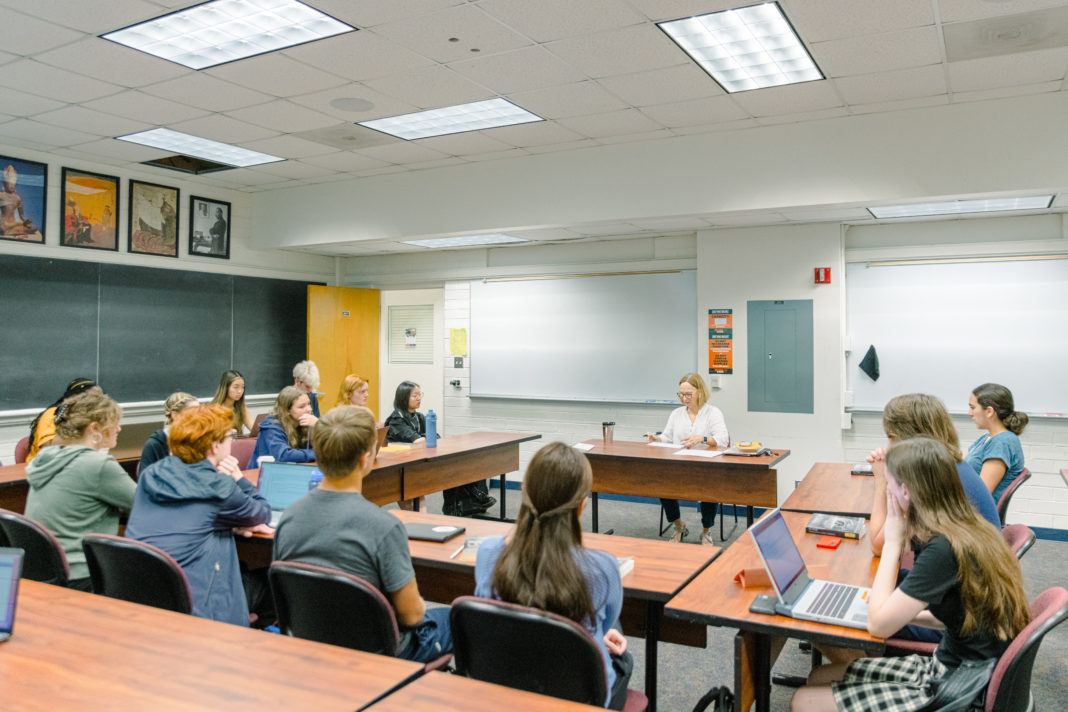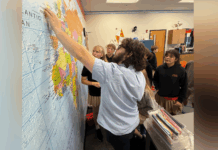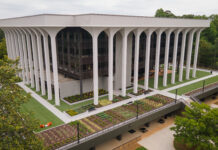Great Books is more than just a program. It’s a way of thinking, teaching and learning through questions and conversation. The long-standing program connects undergraduate students with classic literature and builds a community of shared experiences as they interpret them.
Mercer University’s Great Books curriculum supports the mission and carries out the concepts of the Association of Core Texts and Courses (ACTC). The international professional liberal arts organization has been led by Mercer’s own Dr. Charlotte Thomas since 2021, giving the University a front-row seat to the landscape of teaching core texts and a network for new opportunities.
Thoughtful discussions
Great Books has been a part of Mercer for decades and is one of the most established university programs of its kind in the world, said Dr. Thomas, Great Books director and executive director of ACTC. As a Mercer freshman in 1985, Dr. Thomas was part of the third cohort of students to go through the program, founded by Mercer legends like Dr. Joseph “Papa Joe” Hendricks, Tom Trimble, Dr. Mike Cass and Dr. Peter Brown.
“It’s one of the reasons I came to Mercer as a student, and it’s one of the reasons I wanted to come back as a faculty member,” she said.
Great Books is one of two tracks through which undergraduates in the College of Liberal Arts and Sciences can complete general education course requirements, the other option being Integrative Curriculum (INT). Other schools and colleges at Mercer also allow Great Books classes to count toward graduation requirements, and any of the seven classes may be taken as electives.

During the seminar-style courses, students delve into foundational works in the Western tradition by authors such as Aristotle, Jane Austen, Charles Darwin, Emily Dickinson, Frederick Douglass, Ralph Waldo Emerson, Olaudah Equiano, Homer, Maimonides, Karl Marx, Christine de Pizan, Plato, Sappho, William Shakespeare and William Butler Yeats.
The books are read in chronological order, allowing students to see how the works connect and how the authors respond or draw from one another, said Dr. Kevin Honeycutt, associate professor and chair of philosophy and a Great Books professor.
Textbooks aren’t used in the class, and reflective writings are required rather than tests. Lectures are rare, and instructors sit alongside their students to facilitate thoughtful discussions, Dr. Thomas said.
“As powerful as it is to be someone who knows something and share what you know, there’s also something really powerful about setting that authority aside and seeing what you and a group of smart, open-minded people can do with a book or a question,” Dr. Thomas said.
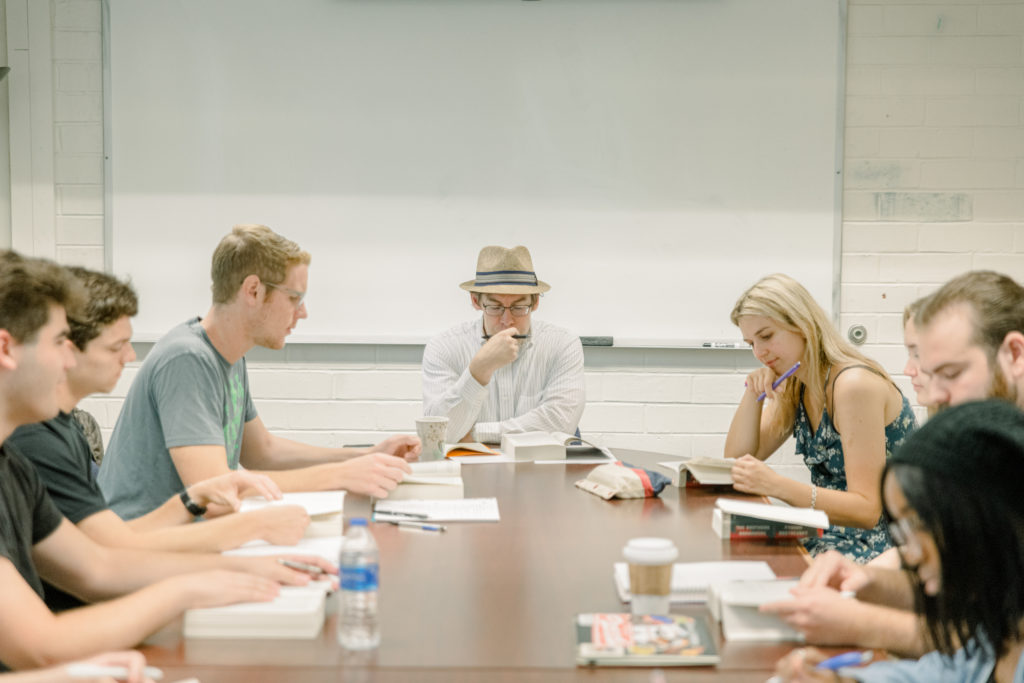
‘Moral and intellectual courage’
Students develop a completely different skill set from traditional lecture courses in core subjects. As they talk about books that have influenced modern culture, they get comfortable expressing beliefs that may be different, providing evidence for their thoughts, and even changing their minds, Dr. Thomas said.
“It gives them skills that will be transferable outside talking about those texts,” said Dr. Kathy Kloepper, professor of chemistry, vice provost of engaged learning and former Great Books director. “A lot of those texts have been really influential in the fields that we’re all trying to pursue. Taking a look backward, we can see how things relate to our own current experiences.”
Senior Drew Robertson, a journalism and creative writing double-major, said her high school didn’t place a large emphasis on the humanities, so Mercer’s Great Books program was especially appealing to her.
“I think I was really drawn to the idea of being able to read and discuss my way through parts of the Western canon,” she said. “Getting to learn (other people’s) thoughts, debate those in a healthy style and widen my view of the world and understanding of how people interpret literature has been amazing and why I’ve decided to stay with the program. It ultimately allows for a deeper engagement in the classroom.”
Robertson said the Great Books courses have taught her how to better express herself through writing and spoken word and how to think on her feet — all skills that apply to her daily and professional life. She’s enjoyed being able to delve into texts that are the foundation of modern thought processes.
“One of the things that Great Books teaches you to do is have moral and intellectual courage,” Dr. Honeycutt said. “It teaches you to not be afraid of putting your ideas out there. That back-and-forth dynamic between the books and the students, Great Books focuses on it almost obsessively. It really makes you proficient in defending your ideas to other people.”
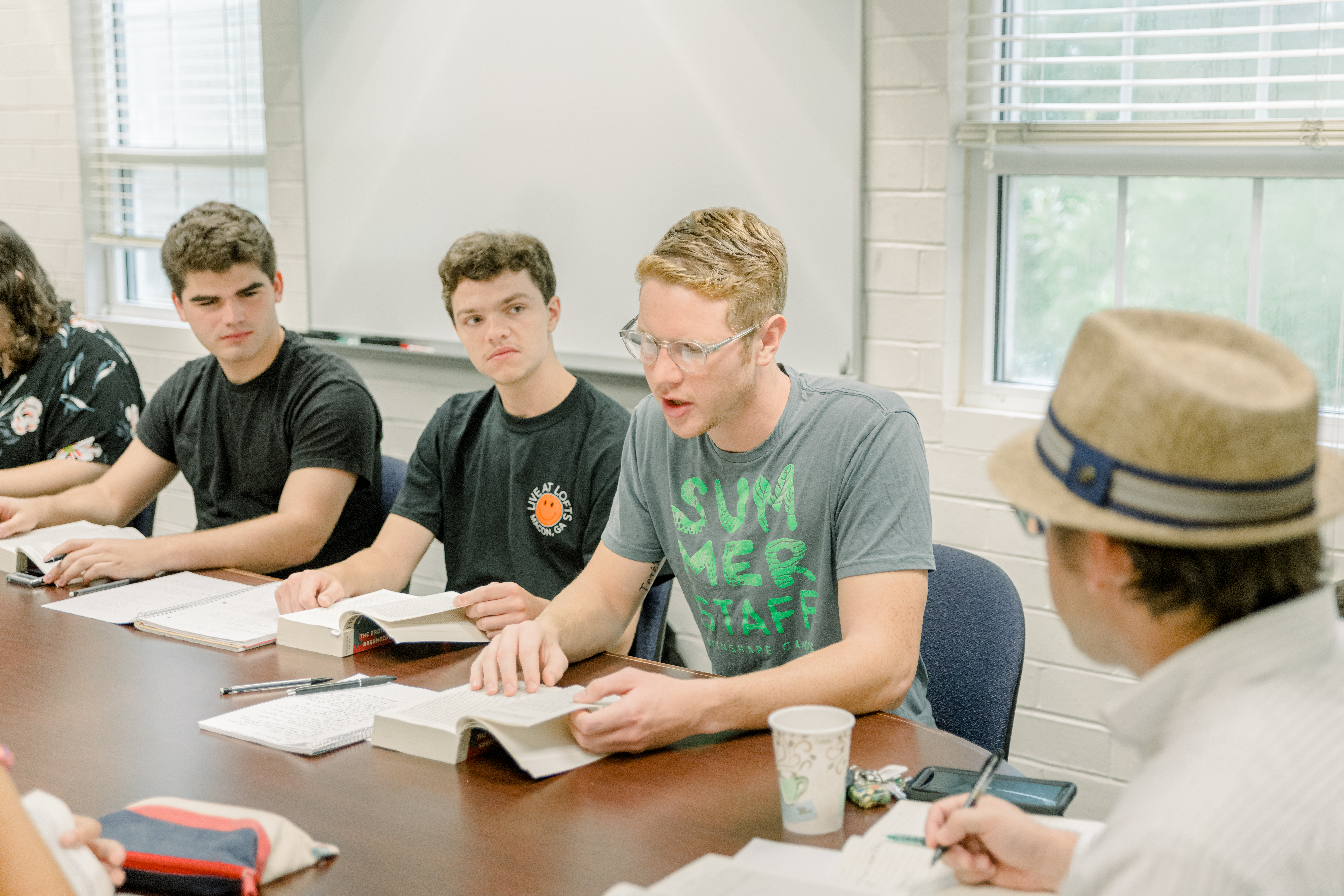
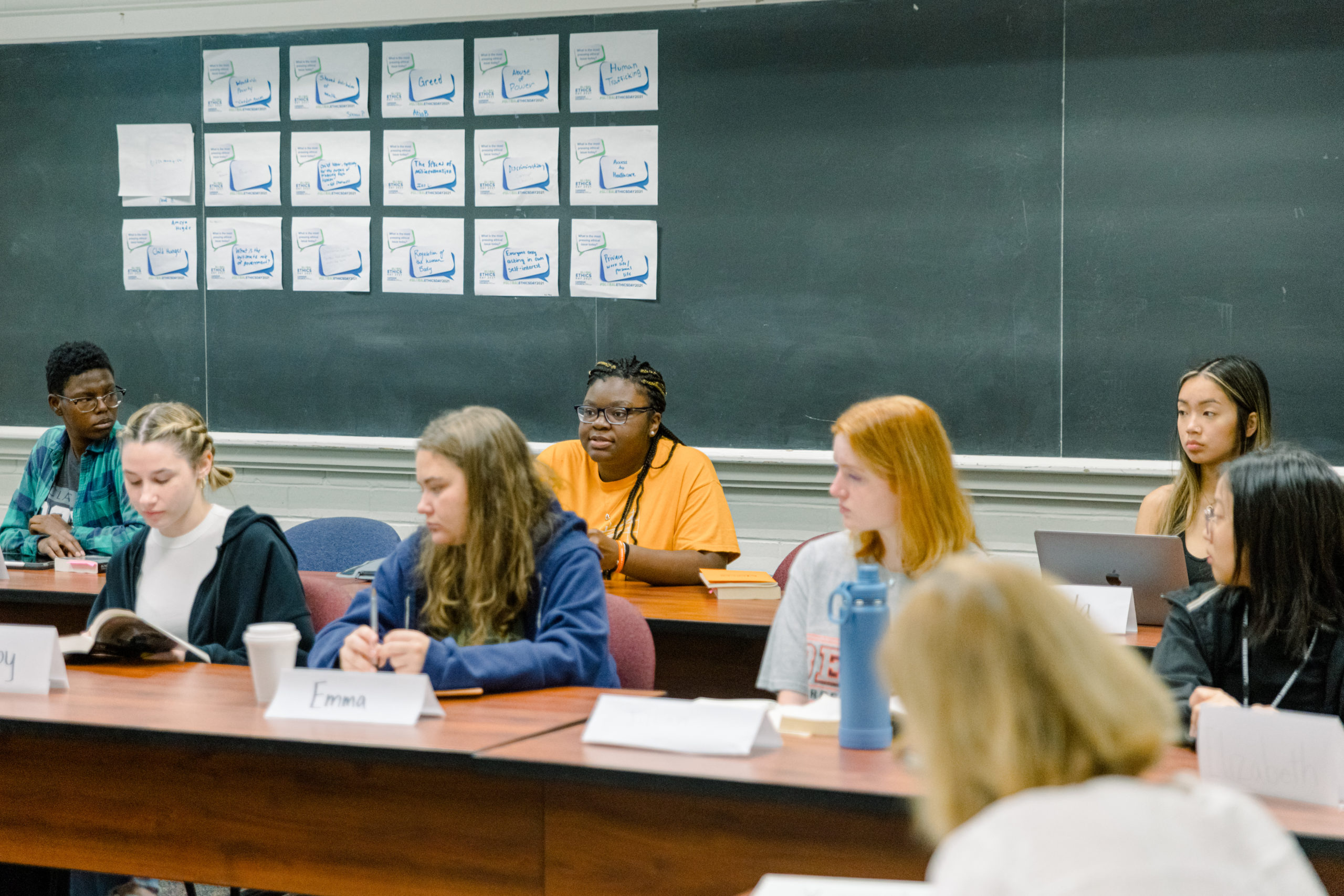
‘What liberal arts is all about’
At Mercer, Great Books faculty come from almost every discipline in the College of Liberal Arts and Sciences, Dr. Thomas said.
Dr. Honeycutt, a Double Bear, said he knew from his experiences as an undergraduate student how valuable the program was and wanted to be a part of it from the other side as a Mercer professor. As a student-athlete with a limited schedule, Great Books courses exposed him to writings in other disciplines that he would not have had the chance to study otherwise. The classes also introduced him to the field of philosophy, which turned into his career.
Dr. Kloepper was involved in the Great Books program at the University of Dallas as an undergraduate, and her “sense of intellectual accomplishment” from tackling challenging texts carried over into her graduate work, she said.
Mercer’s Great Books program was one of the main reasons she joined the faculty here. She welcomed the opportunity to teach outside her primary field. As a Great Books professor, she discovered active learning techniques that also could be applied to her chemistry classes and that she still uses today.
“It’s kind of what liberal arts is all about,” Dr. Kloepper said. “Teaching in Great Books makes me a better chemistry instructor. There’s a lot of value for students in taking these Great Books classes, but for those who teach them, it still helps them to continue to grow.”
Dr. Bryan Whitfield, professor and chair of the Department of Religion as well as a Great Books professor and former director, said the program complements his interdisciplinary style of teaching and learning.
“It’s been a joy to teach in but also to read these texts alongside students,” he said. “I once told a student that I loved college so much I figured out a way to arrange my life so I could never leave, and Great Books helps me to do that. I’m not simply teaching narrowly in a disciplinary area, which I also love, but it gives me a chance to continue to learn myself.
“Many of us who teach in Great Books find it to be one of the highlights of our work at Mercer.”
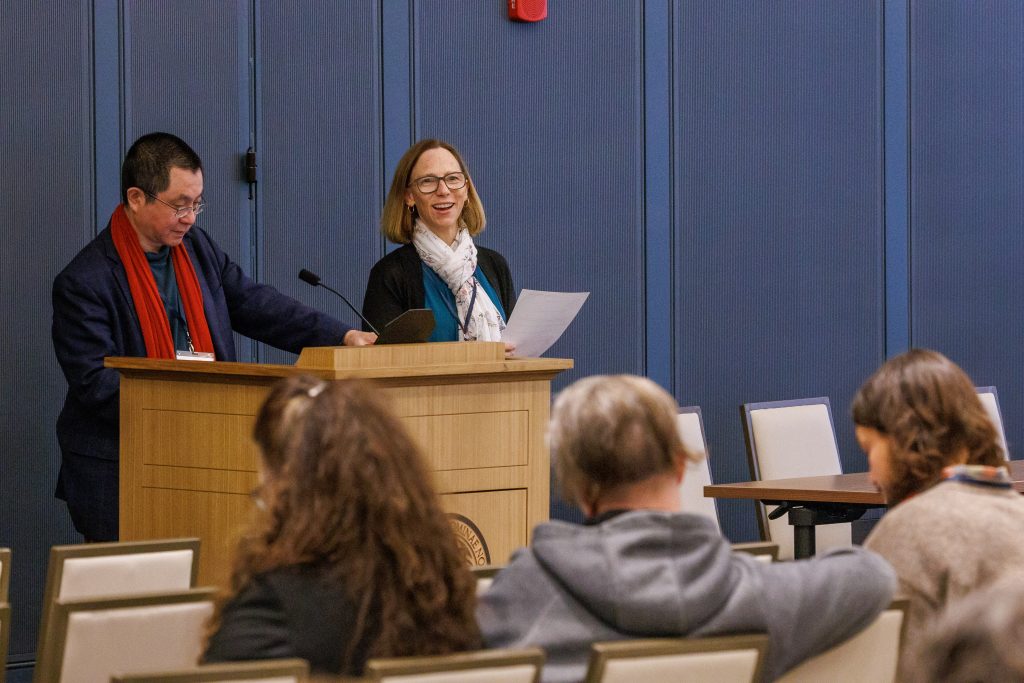
A network of support, resources
The type of teaching and thinking found in Great Books can fall through the cracks at universities, not because the approach is disrespected but because it’s often not built into the institution’s structure, Dr. Thomas. And that’s where ACTC comes in.
The organization provides a professional community for faculty and schools who provide this kind of teaching and courses. ACTC offers opportunities for like-minded individuals across the country and world to connect, focus on research and development, and attend and present at educational conferences. The organization also has a publications program and a new online workshop called “Core Conversations.”
ACTC held a faculty development seminar at the University of Chicago this summer, and Dr. Thomas, Dr. Whitfield and Dr. Thomas Bullington — Great Books and INT lecturer — were among the attendees. As part of the conference, faculty members from each institution gave presentations on how to approach teaching certain books and discussed ways to reshape their curriculum going forward, Dr. Whitfield said.
“There’s a lot of diversity represented both in the kinds of institutions involved (in ACTC) but also in the core texts,” Dr. Whitfield said. “ACTC affirms that different institutions will have different kinds of core text programs. At the same time, there are things that we have in common that allow for some great conversations. ACTC has allowed us to step back from our Mercer context and think about issues of core texts more broadly across the country and to learn from other institutions.”
ACTC will host its European conference in the Netherlands in January, and in the spring, its annual meeting in Dallas and undergraduate student conference at Assumption University in Worcester, Massachusetts, Dr. Thomas said. This past spring, five Mercer students presented during the undergraduate conference in Pennsylvania.
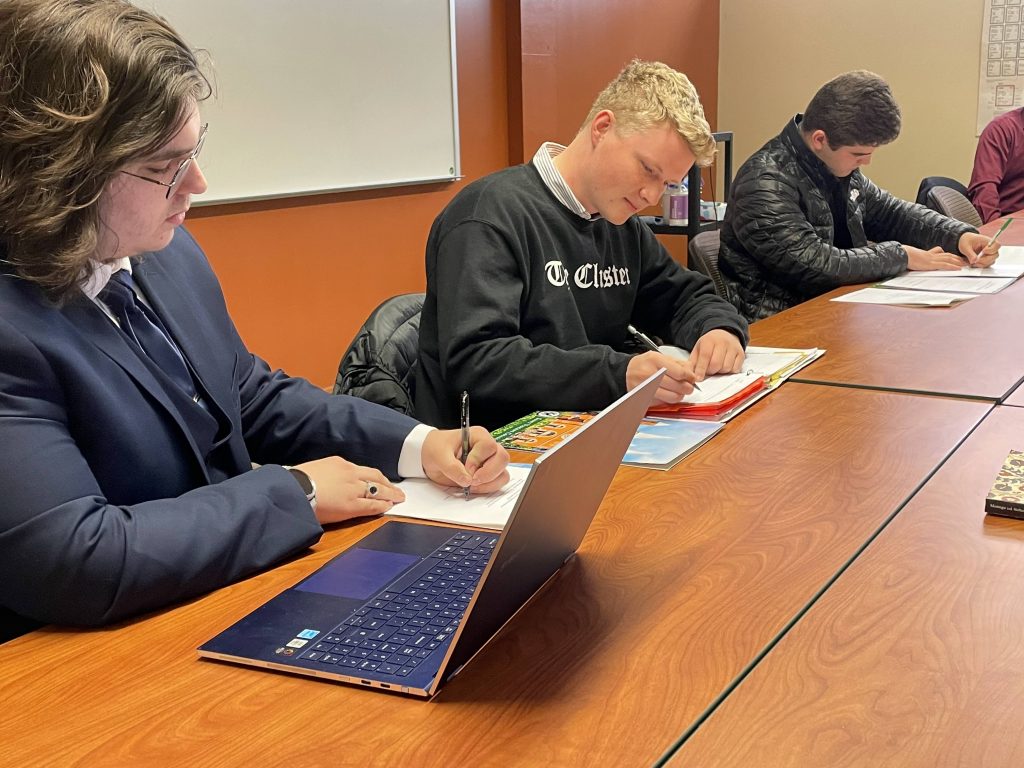
When Mercer hosted ACTC’s annual conference in 2016, the presenters included four Mercer faculty members and five students. The students expand papers from their Great Books classes for these events, and it’s a “formative experience” for them to read alongside accomplished faculty from across the country, Dr. Kloepper said.
“It’s all about finding ways for people who do this kind of education to see each other, help each other and share in this work,” Dr. Thomas said. “Great Books is a great opportunity for students, but the program has also been a great opportunity for the faculty. It creates a community of students and faculty. Becoming an expert in a discipline is powerful and important, but it is also powerful and important to have books in common with your colleagues and students across disciplinary boundaries. What ACTC does is recognize that those networks and commonalities can be maintained on a much larger scale.”
In her work with ACTC, Dr. Thomas said she does everything she can to benefit Mercer and its Great Books program. The University has allowed her to explore what’s possible and offered tremendous support as she’s taken on this executive director position. Her long-term goals in this work include diversifying the core texts represented and developing a study abroad program for the ACTC network.
“My work with ACTC goes hand-in-hand with my work with Mercer,” she said. “Using the network to create new opportunities for my colleagues, taking what I’ve learned and being a part of this long-standing program, and helping other people in this network benefit from this experience, it all feels very dovetailed. A lot of the work I do in one place pays off in others.”
Dr. Thomas is an important advocate for core texts as well as for the liberal arts in general, Dr. Kloepper said.
“Everything she does with ACTC she brings back to Mercer faculty and students,” Dr. Kloepper said. “We get a front-row view of what’s going on in ACTC but also in the broader landscape of teaching those core texts.”

